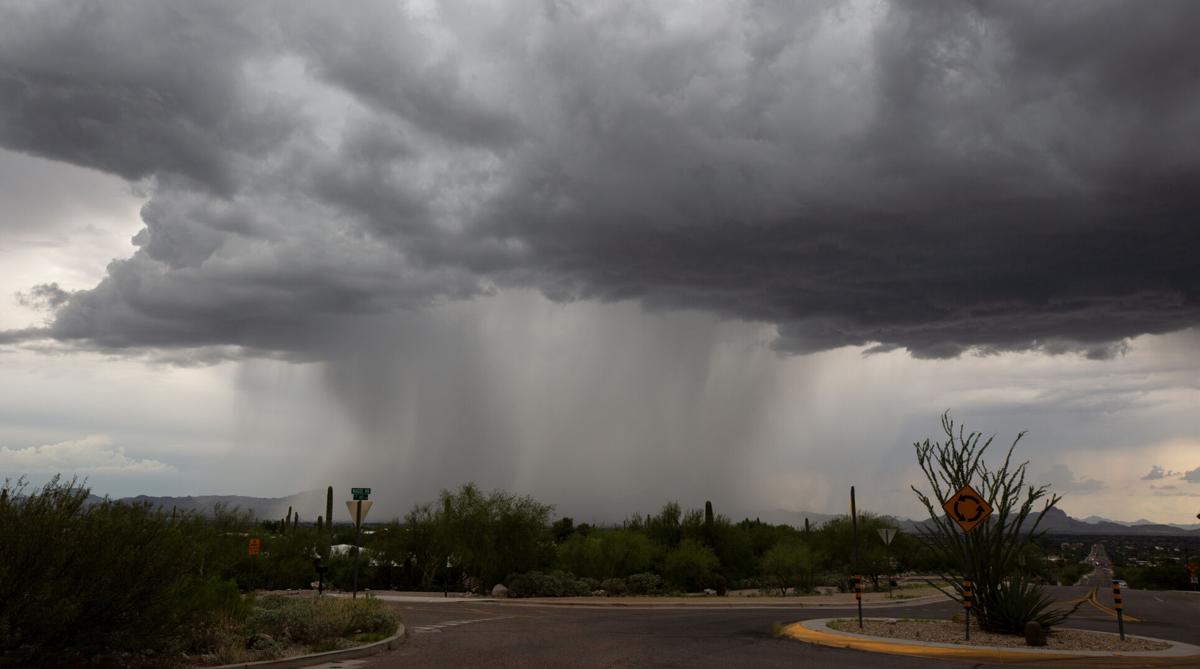We’ve had some incredible monsoons blow through the area these last few weeks, and our phone lines have been flooded with homeowner questions regarding their impact. These are the most common questions.
Question: My roof has hail damage, is it going to leak when it rains?
Answer: Even if your roof sustained damage due to hail, don’t expect it to leak during the next rainstorm. If it didn’t leak during the hailstorm itself, it’s unlikely to leak during the next storm. Typically hail damage is limited to the top layer, leaving the watertight barrier intact. However, with time, this damage may result in further degradation of the roof, and therefore, I recommend having it inspected sooner rather than later.
Q: Will a dust storm impact my indoor air, or negatively impact my A/C system?
A: When the winds pick up along with dust, it is unavoidable that some will find its way into your home. If your AC system is up to par it should snatch the dust-up prior to it embedding itself into your home’s ductwork or AC coils. This eliminates the chance of having dust blown back into your house by the system. That being said, dust can affect your AC system’s functionality. If there’s an excess of dust, the filter will eventually clog, reducing airflow which the system needs to operate efficiently. Your AC’s coils are vulnerable as well. The coils are vital in the process of heat exchange. If too much dust accumulates on the coils, its ability to exchange heat from your indoor air is reduced and so is the system’s efficiency. However, this can all be mitigated with some basic maintenance. Make sure to change your filters monthly, blow the coils with a leaf blower throughout the season to help them stay clean (be sure to turn off the power to the unit prior to doing this), and consider sealing your ductwork to limit the amount of dust weaseling its way into your home. If you are unable to perform the maintenance, hire an Arizona Registrar of Contractors-licensed AC professional.
Q: Can heavy monsoon rain affect my home’s foundation?
A: Yes, it can indeed happen. Your home can experience something known as “foundation heave” which occurs when the soil below absorbs moisture and expands, thus lifting or shifting the foundation. The primary mechanism that drives this phenomenon is known as clay suction. Clay suction typically starts from the perimeter of the foundation, pulling water and other vapors under the foundation, resulting in a heave. It’s important to know the difference between foundation heave and settling. Signs of foundation heave can include, leaning or tilting chimneys, cracks around doors and windows, jamming doors/windows, and cracks in a concrete slab floor.
Settling happens when the soil under and around the perimeter of the house become so dry that it causes cause the foundation to settle. All houses settle a bit when they’re new. The home’s structure will move a little bit until it stabilizes. You may see tiny cracks in floor tiles or sheetrock. That’s normal and no cause for alarm.
Q: Why can’t I find a contractor who can take my project? What’s going on?
A: The past two years have seen a significant rise in home remodeling projects. Contractors in every facet of the remodeling industry are dealing with waitlists for materials in months, rather than weeks or days. Because there was a stop in production during the pandemic, parts, appliances, furniture, cabinetry, windows — you name it, have been difficult to come by. Production has not quite caught up to pre-pandemic levels. In addition, the monsoons bring a lot of rain and wind that cause damage and thus, increase calls for contractors, particularly roofers, landscapers, pool service and builders, AC, and foundation specialists. In addition, a skilled labor shortage remains. Combine them together and you have, well, a perfect storm. Just be patient, and do not be tempted to hire an unsolicited door-to-door contractor, or someone you find on social media without checking them out first with the Arizona Registrar of Contractors.
Q: How can I protect my garden and plants from monsoon damage?
A: There are a few options for protecting your leafy friends. Ensure your yard has proper drainage. If your garden floods it can cause an increase in the amount of topsoil that is washed away. Don’t overwater your plants. They are getting rainwater. To provide protection from the wind, you may want to consider attaching delicate plants to something sturdy. You can also turn the tables and use the monsoon to your advantage. Prior to the next planned storm, add mulch to the yard/garden, and prune your plants. This will allow your plants to utilize the extra water for additional growth, while the mulch will increase the number of nutrients in your soil. Ensure you evict the freeloader weeds from your garden, they serve no purpose but to leech water and nutrients from the plants you actually want.





